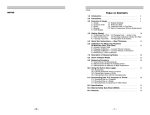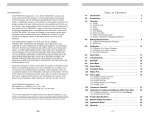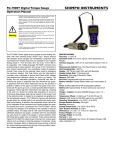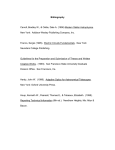Download Rockville RPG8BT Owner`s manual
Transcript
OWNER’S MANUAL Thank you for purchasing this Rockville Power Gig series Bluetooth pro audio speaker. We are very proud to bring you what we consider to be the absolute best value line pro audio speakers. This project has been a culmination of years of development involving a team of dreamers, engineers, designers and marketing gurus. Proudly conceived and developed in the USA, Rockville pro audio speakers are designed and engineered by a team of music enthusiasts, DJ’s and musicians. We have spared no expense in manufacturing these speakers to meet the highest quality standards. With proper care and installation this unit will provide you with the highest levels of sound quality. We hope that this unit will bring you years of performance and reliability. Our goal to you and to your audience is to hear “live performance sound” the way it was meant to be experienced. Please read this installation guide carefully for proper use of your Power Gig series Bluetooth pro audio speaker. Should you need technical assistance during or after your installation please call our technical help line at 1-646-758-0144, Monday through Friday, 9am to 5pm EST. BT Features RPG15BT / RPG12BT • Bluetooth signal input. Now you can input any audio signal from your Bluetooth enabled music player or phone. No cables necessary! • USB/SD digital MP3 music player. Input audio signals, special effects, any pre programmed audio file and amplify it through your system. • Digital MP3 recorder. Now you can actually record back to your USB or SD memory card all audio that passes through your Power-Gig system. Do a show and record it live! • Wireless remote control. Enjoy the added convenience of being able to adjust any of the MP3 player functions, including volume, from the included wireless remote. • Digital signal processor for “Delay / Echo” effect. Now you can time align your digital echo effect and control the echo delay, repeat interval and level. No external signal processing unit necessary, the digital effect is built in with lots of control capabilities. • LCD screen displays MP3 functions including BT connectivity. • Both input channels feature “combo XLR / TRS” inputs for added input versatility. • High-power 2-way pro sound reinforcement speaker system for live sound and playback applications. • Compact and light weight system delivers distortion free sound even at extreme SPL. • Linear Class AB amplifier technology: high power, transparent sonic performance. • Internal switch-mode power supply for low distortion audio with superior transient response. • 5-Band Graphic Equalizer allows you to custom tailor your sound to your venue by boosting and cutting specific frequencies to improve sound quality and clarity. • State-of-the-art 1.75˝ Japanese made pure titanium-diaphragm compression driver for crystal clear high-frequency reproduction. • Ultra-wide dispersion, 40° large-format horizontal wave guide horn molded directly into cabinet. • Ultra-low noise Mic / Line input via combo XLR & 1/4˝ TRS stereo jacks with volume control. • 1/4˝ balanced TRS line out port. • Line RCA and XLR input with separate Volume adjustment. • Additional RCA line output for linking of additional components. • Versatile trapezoidal enclosure design allows different positioning. • Stand mounting with 35mm pole socket. • Tilts on its side for use as a floor monitor with included brackets. • Ergonomically shaped side handle for easy carrying and setup. • Built-in wheels and retractable top handle for increased portability and transport convenience. • High-quality components and exceptionally rugged high impact ABS construction. • Amplifier clip limit LED indicator & power LED cabinet rear. • Front display power meter Blue LED. • 115 / 230 Volt switchable power supply with external user serviceable fusing RPG8BT / RPG10BT • Bluetooth signal input. Now you can input any audio signal from your Bluetooth enabled music player or phone. No cables necessary! • USB/SD digital MP3 music player. Input audio signals, special effects, any pre programmed audio file and amplify it through your system. • Digital MP3 recorder. Now you can actually record back to your USB or SD memory card all audio that passes through your Power-Gig system. Do a show and record it live! • Wireless remote control. Enjoy the added convenience of being able to adjust any of the MP3 player functions, including volume, from the included wireless remote. • Digital signal processor for “Delay / Echo” effect. Now you can time align your digital echo effect and control the echo delay, repeat interval and level. No external signal processing unit necessary, the digital effect is built in with lots of control capabilities. • High-power 2-way pro sound reinforcement speaker system for live sound and playback applications. • Compact and light weight system delivers distortion free sound even at extreme SPL. • Linear Class AB amplifier technology: high power, transparent sonic performance. • Internal switch-mode power supply for low distortion audio with superior transient response. • Built-in bass and treble equalization processor for ultimate system control and speaker protection. • State-of-the-art 1.35˝ Japanese made pure titanium-diaphragm compression driver for crystal clear high-frequency reproduction. • Ultra-wide dispersion, 40° large-format horizontal wave guide horn molded directly into cabinet. • Ultra-low noise Mic / Line input via combo XLR & 1/4˝ TRS stereo jacks with volume control. • Line RCA and XLR input with separate Volume adjustment. • 1/4˝ balanced TRS line out port. • Additional RCA line output for linking of additional components. • Versatile trapezoidal enclosure design allows different positioning. • Stand mounting with 35mm pole socket. • Tilts on its side for use as a floor monitor with included brackets. • Ergonomically shaped side mount handle for easy carrying and setup. • High-quality components and exceptionally rugged high impact ABS construction. • Amplifier clip limit LED indicator & power LED cabinet rear. • Front display power meter Blue LED. • RPG10BT features 115 / 230 Volt switchable power supply with external user serviceable fusing (RPG8BT 115 Volt only, no fuse). BT IMPORTANT SAFETY INSTRUCTIONS RISK OF ELECTRIC SHOCK DO NOT OPEN • • • • To reduce risk of electric shock, never open the unit. There are no user serviceable parts, refer service to an authorized Rockville service center. Do not expose this unit to any kind of moisture. Please ensure that the unit is situated in a properly ventilated area. Make sure the unit is placed on a level and stable surface. Setting Up Your Power Gig Professional Sound System Your Power Gig is set up to produce the full spectrum of sound from its woofer and tweeter horn combination. The lower frequencies seek out the floor of the room they are playing and travel along the floor and walls. The tweeter horn is more directional. Hence when setting up your system its more important to make sure that the tweeter horns are not blocked by any furniture and are located / aimed at ear level to the listening audience. Woofer aiming is not as critical as explained previously due to the nature of the woofer sounds able to travel through various paths even when blocked. It is therefore recommended that when setting up your system you set up your speakers on speaker stands, such as the Rockville model RVSS-2 (not included) so that the tweeter sounds will radiate above the listening crowd. This will guarantee optimum sound dispersion and achieve clear vocal sound reproduction. How To Avoid Irritating Feedback The placement of your microphone is critical in avoiding feedback through your Power Gig system. Never set up your microphone in front of the speaker. Always set up your microphone behind the speaker. When approaching the speaker to make any adjustments, we recommend approaching the speaker from the rear and not walking directly towards the front of the speaker. Stage Monitor Setup Your Power Gig speaker comes standard with two brackets which snap in to the cabinet sides allowing it to be placed on the floor at an angle as a stage monitor. Unlike a PA setup which face the crowd, stage monitors are set up to face the performer on stage and to direct the sound towards them. This presents a particular problem as now feed back may occur. To avoid stage monitor feedback the following precautions should be taken. BT 1. Choose a microphone with high directivity, i.e. cardioid or hyper-cardioid polar pattern. 2. Never point the microphone directly down in front of the speaker. Holding the micro phone in normal position will allow you to be closer to the stage monitor with out feed back. 3. See illustration below as to position of microphones when mounted in stand. Cardioid polar patter microphones should always be at a 90 degree angle to the axis of the stage monitor. Hyper Cardioid polar pattern microphones should be positioned at an acute angle to the sage monitor. You may choose to add a feedback eliminating processor to your system for additional flexibility on stage. Cardioid Polar Patter Hyper Cardioid Polar Patter A Word About System Volume Controls and Gains. There is really only one volume control on the Power Gig unit, that is the knob marked MASTER. The Mic In Balanced volume control and secondary input gain control are matching devices to match the preamp voltages of items such as microphones and guitars or other musical instruments with your Power Gig unit. Never turn these up to maximum unless indicated by the instructions below. With a properly matched signal your system will produce less distortion, be subject to less feedback, and will produce louder, cleaner and clearer sound. Use the Master control as your volume once all inputs are matched properly. Your Power Gig features a CLIP LED indicator to help you set and match your components. Please be sure to read all set up instructions so your Power Gig sounds its best. APPLICATION USES Microphone Presentations Your Power Gig features two ultra-low noise Mic/Line input via combo XLR & 1/4˝ TRS stereo jacks. 1. Make sure the Power Gig is in OFF position. 2. Plug in your microphone. 3. Keep Master Volume at 0 position. 4. Turn Mic Volume to 0 position. 5. Switch on the Power Gig unit. 6. Slowly turn Mic Volume clockwise until you achieve appropriate volume setting. This is determined by the CLIP LED indicator light. Proper function is achieved when the CLIP indicator lights up at peak levels, it should never be in constant on position. 7. The above adjustment matched the microphone preamp to the input volume of the Power Gig unit. 8. Now turn up the Master Volume to necessary volume by rotating clockwise. Always stand behind the Power Gig when making your microphone adjustments to avoid feedback distortion. 1 POWER 2 3 6 6 4 OFF 5 POWER 8 ON POWER CLIP Multi-Microphone Hook Up You can choose to hook up two microphones to your Power Gig in the following manner. Set up microphone #1 as instructed above. Using same set up instructions, insert microphone #2 into second ultra-low noise Mic/Line input which features its own separate Volume control. Use this Volume control to increase the microphone level and balance the inputs between the two microphones before attempting to adjust the Master Volume. BT Public Address / Concert Mixer Setup When setting up for larger venues, a mixing console becomes a critical piece of equipment for appropriately mixing signals from multiple inputs such as singers, speakers, effects devices, musicians and of course allows for multiple speaker utilization. To connect a mixing console begin by. 1. Turning your Power Gig unit to OFF position. 2. Turn Master Volume to 0 position. 3. Turn Mic Volume to 0 position. 4. Connect the LEFT OUTPUT of mixer to the Mic In connection of your Left Power Gig Unit. 5. Connect the RIGHT OUTPUT of mixer to the Mic In connection of your Right Power Gig Unit. 6. Switch ON your Power Gig unit. 7. Slowly raise the level of the mixer output to the 0dB level position. 8. Slowly turn the MIC IN BAL volume control clockwise until the CLIP LED indicator begins to blink, then turn it down slightly. This indicates the maximum input voltage gain is matched and set properly. 9. Turn Master Volume up to achieve proper volume. 1 3 2 POWER OFF LEFT UNIT 4 RIGHT UNIT 5 6 POWER ON 7 8 9 Line Input Feature You can use the Line Input function when you wish to hook up an additional stereo signal source without the use of a mixer console. CD players, DVD music players, MP3 players etc can be plugged directly in to the RCA jacks labeled LINE INPUT. To connect a CD, DVD music player or MP3 player. 1. Turning your Power Gig unit to OFF position. 2. Turn Master Volume to 0 position. 3. Turn Aux/MP3 Volume control to 0 position. 4. Connect the music source unit to the RCA jacks marked Aux In. 5. Use the push button (located next to RCA jacks) to select between Auxiliary input or MP3 input. 6. Switch ON your Power Gig unit. 7. Slowly turn the Aux/MP3 Volume control clockwise until the CLIP LED indicator begins to blink, then turn it down slightly. This indicates the maximum input voltage gain is matched and set properly. 8. Turn Master Volume up to achieve proper volume. 1 2 POWER 3 4 7 7 OFF 5 6 POWER ON 8 POWER CLIP BT Keyboard Amplification While guitarists and bassists have their own amplifiers to ensure that the volume produced by their instrument matches that of the other sound sources on stage, keyboards and synthesizers are a different story. They usually have no built-in speakers which means they need an external sound source. The Power Gig unit allows for the connection and mixing of two keyboards. More than two keyboards can be connected using a sub mixer to mix down the signals and send them to the Power Gig unit via the sub mixer output connectors. Installation Be sure to have your Power Gig units installed by a qualified installation professional. Ensure that the unit is properly grounded during and after installation. Not doing so may result in electrostatic discharge which may cause damage your equipment. Multipurpose Input Port A. Mic input port accepts XLR type connectors and is designed to suit a wide range of balanced and unbalanced signals. We recommend using professional balanced dynamic, condenser or ribbon mics as they are least likely to be affected by interference. Low cost, high impedance mics can be used, however the level of background noise is higher since an unbalanced circuit is far more susceptible to interference. B. Line input port accepts balanced and unbalanced 1/4˝ TRS plugs. It accepts signals from a variety of sources such as keyboards, electronic drums, tape recorders, mixers, etc. It will not process microphone input. When you use an unbalanced 1/4˝ TRS plug, the line input automatically turns the ring into ground. A. XLR Balanced/Unbalanced B. 1/4˝ TRS Balanced/Unbalanced Mic Out Balanced Connection. The 1/4˝ TRS output marked Line Out allows for daisy chaining of signals from one Power Gig unit to another. Simply attach an 1/4˝ TRS cable between the two units to share signals. The input into Power Gig #2 should go to the either the MIC 1 or MIC 2 input. You can even choose to use Power Gig # 1 for microphone inputs and Power Gig #2 for musical instrument inputs and mix the two units together. Please note that due to internal design constraints, the RPG8BT unit does not feature the line out option. LINE OUT BT Bluetooth Pairing To connect your iPod, iPhone, MP3 player, Android phone or any other Bluetooth capable device follow the steps listed below. 1. Make sure the Power Gig unit’s power switch is in the ON position. 2. Turn on the Bluetooth feature on your device and ensure that it is in “discoverable” mode. 3. Push the Mode button on your Power Gig unit until you are in Bluetooth mode. 4. Once in Bluetooth, the unit should automatically pair with your device. 1 2 POWER ON BLUETOOTH ON DEVICE DISCOVERABLE 3 4 1 2 3 PL AY NEXT 5 4 6 7 8 9 11 10 12 13 14 AC 115V~60Hz T 1.6A/250V BT 1. MP3 Player controls. Previous / Next track buttons also serve as volume controls. For track control quickly press button. For volume control press an hold button. Press Play button once to play track, press again to pause. 2. USB and SD/MMC Card input. 3. Mode control switches between input modes: Bluetooth, USB, and SD/MMC. 4. 2 band equalization control panel. • Bass adjust the low frequencies to +/-15dB. • Treble adjust high frequencies to +/-15dB 5. This knob controls the Mic input volume. 6. Multipurpose input port. • Mic input port accepts XLR type connectors and is designed to suit a wide range of balanced and unbalanced signals. We recommend using profesional balanced dynamic, condenser or ribbon mics as they are least likely to be affected by interference. Low cost, high impedance mics can be used, however the level of background noise is higher since an unbalanced circuit is far more susceptible to interference. • Line input port accepts balanced and unbalanced 1/4˝ TRS plugs. It accepts signals from a variety of sources such as keyboards, electronic drums, tape recorders, mixers, etc. It will not process microphone input. When you use an unbalanced 1/4˝ TRS plug, the line input automatically turns the ring intto ground. 7. Master volume control knob. 8. Auxiliary / MP3 input selector switch. 9. Pre-Amp RCA input / output jacks. 10. Auxiliary input / output volume control. 11. Power LED indicator. 12. Amplifier clip limit LED indicator. 13. Power cord 14. Power switch 1 2 3 PL AY NEXT 6 4 5 7 8 11 9 12 10 13 14 15 16 17 BT 1. MP3 Player controls. Previous / Next track buttons also serve as volume controls. For track control quickly press button. For volume control press and hold button. Press Play button once to play track, press again to pause. 2. USB and SD/MMC Card input. 3. Mode control switches between input modes: Bluetooth, USB, and SD/MMC. 4. Digital delay effect (echo) control panel. • The Repeat knob controls the rate of the delay. • The Delay knob controls the time interval of the delay. • The Level knob adjusts the mix level of the effect sound. 5. 2 band equalization control panel. • Bass adjust the low frequencies to +/-15dB. • Treble adjust high frequencies to +/-15dB 6. This knob controls the Mic input volume. 7. Multipurpose input port. • Mic input port accepts XLR type connectors and is designed to suit a wide range of balanced and unbalanced signals. We recommend using professional balanced dynamic, condenser or ribbon mics as they are least likely to be affected by interference. Low cost, high impedance mics can be used, however the level of background noise is higher since an unbalanced circuit is far more susceptible to interference. • Line input port accepts balanced and unbalanced 1/4˝ TRS plugs. It accepts signals from a variety of sources such as keyboards, electronic drums, tape recorders, mixers, etc. It will not process microphone input. When you use an unbalanced 1/4˝ TRS plug, the line input automatically turns the ring into ground. 8. Auxiliary / MP3 input selector switch. 9. Pre-Amp RCA input / output jacks. 10. Auxiliary input / output volume control. 11. Master volume control knob. 12. Power LED indicator. 13. Amplifier clip limit LED indicator. 14. Power switch 15. IEC AC power socket 16. Fuse compartment 17. Variable voltage selector switch (115v / 230v) / 1 2 6 3 7 8 9 10 4 11 5 12 13 14 15 5V 16 2 0V LINE OUT 17 T 5A/250V 18 BT 1. MP3 Player controls. • Press Play button once to play track, press again to pause. • Mode control switches between input modes: Bluetooth, USB, SD / MMC, and Radio. • Rewind Button. • Previous / Next track buttons also serve as volume. controls. For track control quickly press button. For volume control press and hold button. • Record button allows you to record input back to your USB drive or SD / MMC card. 2. USB and SD / MMC Card input. 3. 5 band graphic equalizer. Adjust frequencies to +/-12dB 4. Digital delay effect (echo) control panel. • The Repeat knob controls the rate of the delay. • The Delay knob controls the time interval of the delay. • The Level knob adjusts the mix level of the effect sound. 5. Master volume control knob. 6. These knobs control the Mic Digital effect volume as well as the input volume. 7. Multipurpose input port(s). • Mic input port accepts XLR type connectors and is designed to suit a wide range of balanced and unbalanced signals. We recommend using profesional balanced dynamic, condenser or ribbon mics as they are least likely to be affected by interference. Low cost, high impedance mics can be used, however the level of background noise is higher since an unbalanced circuit is far more susceptible to interference. • Line input port accepts balanced and unbalanced 1/4˝ TRS plugs. It accepts signals from a variety of sources such as keyboards, electronic drums, tape recorders, mixers, etc. It will not process microphone input. When you use an unbalanced 1/4˝ TRS plug, the line input automatically turns the ring intto ground. 8. Digital effect and input volume control knobs for secondary Mic input. 9. Secondary Mic input. See item 7 for details. 10. Auxiliary / MP3 input selector switch. 11. Pre-Amp RCA input / output jacks. 12. Auxiliary input / output volume control. 13. Amplifier Clip limit LED indicator and Power LED indicator. 14. Power switch. 15. IEC AC power socket. 16. Fuse compartment. 17. 1/4˝ TRS Line Out. 18. Variable voltage selector switch (115v / 230v). Front Side Peak Level Limiter Your Power Gig unit features a blue LED on the cabinet front to the left of the woofer. This LED is not a clip indicator but a system level meter. You do not have to be concerned if this LED lights steadily or blinks, it is simply monitoring your musical output and indicating to you proper function of the Power Gig unit. Trouble Shooting UNIT FAILS TO POWER UP. 1. Make sure unit is plugged in properly to wall outlet. 2. Check that power cable is plugged in tightly to unit. 3. If people or equipment tend to step and roll over or stretch your power cable it can get damaged. Always try a second cable to test for shorts in original cable. Dispose of original damaged power cables immediately. 4. If system still fails to light, UNPLUG FROM WALL. There is a small door below the plug input on the Power Gig unit, pop off this door and remove the fuse with a needle nose pliers and replace with same rated fuse. Please make sure unit is unplugged from wall before attempting to change the fuse! UNIT TURNS ON, BUT NO SOUND. 1. Check that Master Volume is turned up. 2. Be sure your microphone is turned on. 3. All appropriate cables should be plugged in correctly. 4. If using a mixing console make sure fader and balance are set to center positions and level increased. 5. Be sure Volume of appropriate channels are set above 0 level and matched correctly as indicated above. Fuse replacement Diagram OLD FUSE SPARE FUSE BT FEDERAL COMMUNICATIONS COMMISSION COMPLIANCE INFORMATION Responsible party name: Rockville Address: 333 Pearsall Ave. Cedarhurst, NY 11096 Hereby declares that the product(s) Power Gig series Bluetooth pro audio speakers comply with FCC rules as mentioned in the following paragraph: This device complies with Part 15 of the FCC rules. Operation is subject to the following two conditions: (1) this device may not cause harmful interference, and (2) this device must accept any interference received, including interference that may cause undesired operation. Note: This equipment has been tested and found to comply with the limits for a Class B digital device, pursuant to Part 15 of the FCC rules. These limits are designed to provide reasonable protection against harmful interference in a residential installation. This equipment generates, uses and can radiate radio frequency energy and, if not installed and used in accordance with the instructions, may cause harmful interference to radio communications. However, there is no guarantee that interference will not occur in a particular installation. If this equipment does cause harmful interference to radio or television reception, which can be determined by turning the equipment off and on, the user is encouraged to try to correct the interference by one or more of the following measures: • • • • Reorient or relocate the receiving antenna. Increase the separation between the equipment and receiver. Connect the equipment into an outlet on a circuit different from that to which the receiver is connected. Consult the dealer or an experienced radio/TV technician for help. © 2013 ROCKVILLE // Features and specifications are subject to change and or improvement without notice.

































